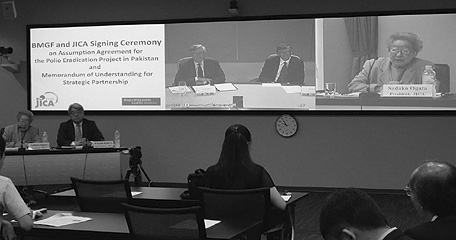Japan's Official Development Assistance White Paper 2011
Keyword 2
Partnering with Private-sector Funding
The "Polio Eradication Project" ODA loan to Pakistan (Exchange of Notes signed August 2011; ¥4.993 billion) is an epoch-making project that involves a partnership between Japan's ODA and a private foundation.
Like Afghanistan and Nigeria, Pakistan is a polio-endemic country (a country in which polio has never been eradicated). The large-scale movement of the population due to damage from flooding in 2010 was one cause of the spread of the disease, and the number of cases increased to 144. This number accounts for approximately 11.2% of the 1,290 cases reported worldwide.
In addition to regular vaccination activities, the government of Pakistan has implemented nationwide simultaneous vaccination as part of its polio eradication campaign, in order to cut polio off at the roots. In addition, the government announced a national plan in January 2011 focused particularly on eradicating polio.
For the past 15 years, Japan has, in partnership with UNICEF, provided the vaccines necessary for the polio countermeasures through grant aid, has implemented technical cooperation to support the expansion of regular vaccination activities, and has also supported the efforts of the government of Pakistan. However, with the impact of the aforementioned flooding and other factors, the efforts of the Pakistani government are making little headway. In that context, Japan engaged in discussions with the Bill & Melinda Gates Foundation (a private charity organization established by Microsoft founder Bill Gates and his wife; hereafter "Gates Foundation"), which is also working toward eradication of polio, and made the decision to partner with the Gates Foundation to provide ODA loan. For approximately two years, support will be provided for procurement of the vaccines needed for Pakistan’s domestic polio eradication campaign, as well as the funds for administration of the vaccination.
When it has been confirmed that a high rate of vaccination and certain other goals have been reached, the Gates Foundation will repay the entire debt for the ODA loan to Japan in place of the Pakistani Government. By establishing a mechanism by which the Pakistani Government is not required to repay the loan if the goals are achieved, a higher level of effort toward eradication of polio can be drawn out from the Government. In addition, it ultimately becomes possible to provide assistance with large-scale funding, without placing a burden of debt on the Pakistani Government. This project is a new and deeply significant attempt, from the standpoint of collaborating with the Gates Foundation and a diverse range of development partners, including joint financing with the World Bank (support only for procurement of polio vaccines), and partnership with UNICEF and WHO to procure vaccines and implement the campaign, etc.
As has been the case with the partnership with the Gates Foundation, there are high expectations that fusing the experience and knowledge obtained at the sites of assistance and the close network that the Japanese government has with the governments of developing countries, with the high level of technological and financial power and the ability to make policy recommendations that are possessed by the private sector, a new player in providing aid, will allow efforts toward development to have a wide range of impact in the future, and that the effects will spread.

JICA President Sadako Ogata and Bill Gates, co-chair of Gates Foundation at a signing ceremony conducted via teleconferencing between Japan and the U.S. (Photo: JICA)
